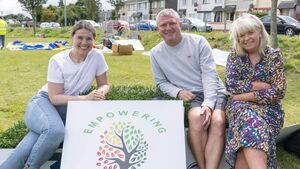Living Greener: Embrace relationships, they form our community

Maria Healy, Jason Leigh and Patricia Berry at the Athy West Family Fun Day last year Photo: Aisling Hyland
AS we sit alone in cars or cubicles, listening to our own headset at work or earbuds on the bus, staring at our own screen at work or at home, we find it difficult to imagine how communal and intimate all life was for most people, in most cultures, as long as we have been human.
In Ireland as in most cultures, people ploughed fields, footed turf and harvested hay together, making light work of many hands. Everyone celebrated and grieved together, their losses lessened because they were shared, and their joys heightened because they were shared.
Living uprooted the way most modern humans do, spending our lives adrift in a sea of strangers and rarely seeing loved ones, was for most cultures the worst punishment imaginable.
Ancient Greeks chose death rather than exile, condemned to be a stranger in a strange land. International law today condemns solitary confinement — being isolated in an enclosed space — as literal torture, but that is how many of us spend our lives. Whether on city streets, on buses and planes, in offices and bars, many of us are alone even in a crowd.
In every society, of course, some people left the village or the farm. Even then, though, everyone acknowledged that being cut off from one’s blood was a kind of death; when a son or daughter in rural Ireland left for America seeking work, everyone in the village held an “American wake,” a funereal celebration, as though the departing was already departed.
Those who joined the army, or a monastery, or who went to sea as Ishmael did in Moby Dick, then lived with a new family, a “brotherhood” like the brothers they might have left.
Even today, when people look back at the best times of their lives, it was usually when they were thrown together – say, in college – in the same kind of closeness, when we briefly felt as humans should.
When we must deal with others, we have to stretch beyond our inner world, as they are beyond theirs, and create a new living thing – a relationship – in the space between us.
Relationships are more than the sum of the people, but create something new, as the green gas chlorine and soft metal sodium combine to become salt, completely unlike its component parts. Different people bring out different things in us, and our identities subtly reshape to fit them, never completely reverting to their former shape.
A collection of relationships forms a community, an organic living thing with its own personality different from the people who comprise it.
Those relationships can also demand much of us, which is why we find it so easy to flee from them into screens.
They force us to be kind when we don’t feel like it, to use diplomacy, and to put ourselves in the place of others -- to practice the qualities that separate humans from other animals.
They make us endure the quirky habits of others long enough to build an immunity to them, and perhaps even appreciate them.
We have all known people who hated each other at first and then became friends or romantic partners, and when loved ones pass out of this life, we have all fondly remembered the eccentricities that might have once annoyed us.
Our modern world of earbuds and phones, of social media and online chats, by contrast, lets us unfriend and shut out anyone that doesn’t immediately please us with their first impression, as well as all subsequent impressions.
The online mob is ready to attack, slander and cancel any of us, if we even once express opinions not the same as everyone else’s.
We screen out most of the relationships that would truly help us grow into understanding adults. Between the recent pandemic, the cancel culture that has shattered relationships, and the surge in crime in Ireland, many people I talk to have become isolated in their own homes, and mental illness has skyrocketed.
We could turn away from our screens, though. We could knock on the neighbours’ doors and invite them for tea, to play ball with children instead of allowing them to play a video game, and to revive the kind of communities we once had one relationship at a time.





